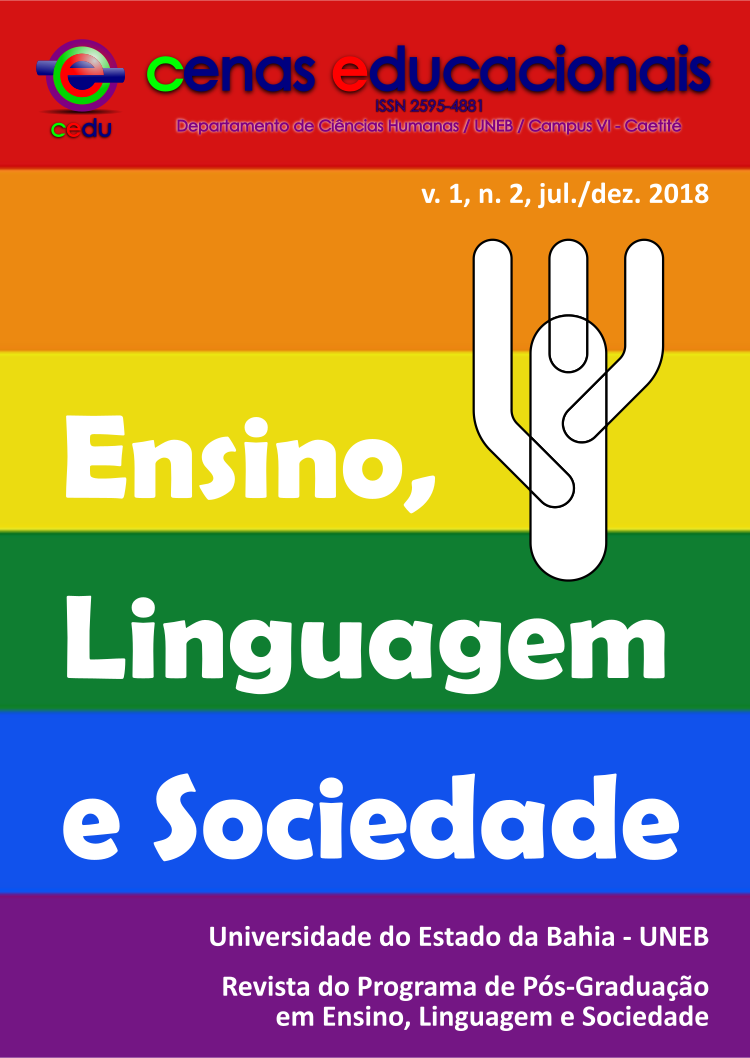TEACHER EDUCATORS’ VIEW ABOUT TEACHING ENGLISH AS A LINGUA FRANCA
Keywords:
English Language Teaching. English as a Lingua Franca. Teacher educators.Abstract
Although there has been a large number of studies on the new status of English as a Lingua Franca (ELF), these discussions have not been effectively integrated into the English language teaching (ELT) in pre-service teacher education. Once we believe that teacher trainers are driving forces for possible changes in the curricula of the courses, this research aims to verify how teacher educators of a Letters/English course at the State University of Bahia (UNEB), Campus VI, in Caetité/BA, understand ILF and how they visualize this perspective in current teaching context. The theoretical basis consists mainly of contributions from Seidlhofer (2011), Jenkins (2007), Jenkins, Cogo and Dewey (2011), Widdowson (2012), El Kadri and Gimenez (2013), Graddol (2006), among others. Data was processed from the application of a questionnaire and analyzed under the perspective of qualitative research. The results showed that, besides recognizing the ELF paradigm as a legitimate one, the teacher trainers also see it positively, considering it as a necessary and relevant incentive to the English teaching and learning process today. However, the informants still do not consider themselves fully ready to disengage from the imposition of the norms attached to the native speaker model, and finally to address the diversity of the English language in the classroom.Downloads
References
ASSIS-PETERSON, A. A de; COX, M. I. P. O professor de inglês: entre a alienação e a emancipação. Linguagem & Ensino, v.4, n.1, p.11-36, 2001.
ASSIS-PETERSON, A. A de; COX, M. I. P. Standard English & World English: entre o siso e o riso. Calidoscópio, v.11, n.2, p.153-166, maio/ago. 2013.
DEWEY, M.; LEUNG, C. English in English Language Teaching: shifting values and assumptions in changing circumstance. Working Papers in Educational Linguistics, v.25, n.1, p.1-15, 2010.
EL KADRI, M. S.; GIMENEZ, T. Formando professores de inglês para o contexto do inglês como língua franca. Acta Scientiarum: Language & Culture, v.35, n.2, p.125-133, Abril/Jun., 2013.
GIMENEZ, T. Permanências e rupturas no ensino de inglês em contexto brasileiro. In: LIMA, D. C. de (Org.). Inglês nas escolas públicas não funciona? Uma questão, múltiplos olhares. São Paulo: Parábola editorial, 2011.
GRADDOL, D. English next. London: British Council, 2006.
HÜLMBAUER, C; BÖHRINGER, H; SEIDLHOFER, B. Introducing English as a lingua franca (ELF): Precursor and partner in intercultural communication. Synergies Europe, n.3, p.25-36, 2008.
JENKINS, J. English as a lingua franca: attitude and identity. Oxford: Oxford University Press, 2007.
JENKINS, J.; COGO, A.; DEWEY, M. Review of developments in research into English as a lingua franca. Language Teaching, v. 44, n. 3, p. 281-315, 2011.
KALVA, J. M.; FERREIRA, A. de J. Inglês como língua franca e a concepção de identidade nacional por parte do professor de inglês: uma questão de formação. Fórum Linguístico, Florianópolis, v. 8, n. 2, p. 165-176, jul./dez. 2011.
KUMARAVADIVELU, B. Individual identity, cultural globalization and teaching English as an international language: The case for an epistemic break. In: ALSAGOFF, L.; RENANDYA, W; HU, G.; MCKAY, S. L. (Eds.). Teaching English as an international language: principles and practices New York: Routledge, 2012, p. 9-27.
RAJAGOPALAN, K. Maria Nilva Pereira pergunta/Kanavillil Rajagopalan responde: o inglês como língua internacional na prática docente. In: LIMA, D. C. (Org.). Ensino e aprendizagem
de língua inglesa: conversas com especialistas. São Paulo: Parábola, 2009. p. 39-46.
RAJAGOPALAN, K. O “World English”: um fenômeno muito mal compreendido. In: GIMENEZ, T.; CALVO, L. C. S.; EL KADRI, M. S. (Org.). Inglês como língua franca: ensino-aprendizagem e
formação de professores. Campinas: Pontes, 2011.
REES, D. K. Considerações sobre a pesquisa qualitativa. Signótica, v. 20, n. 2, p. 253-274, jul./dez. 2008.
SEIDLHOFER, B. Research perspectives on teaching English as a Lingua Franca. Annual Review of Applied Linguistics, v. 24, 2004. p. 209-239.
SEIDLHOFER, B. Understanding English as a lingua franca. Oxford, UK/China: Oxford University Press, 2011.
SIFAKIS, N. C. ELF awareness as an opportunity for change: a transformative perspective for ESOL teacher education. Journal of English as a Lingua Franca, v.3, p.317–335, Ago. 2014.
WIDDOWSON, H. G. The Ownership of English. TESOL Quarterly, v. 28, n. 2, p. 377-389, 1994.
WIDDOWSON, H. G. ELF and the inconvenience of established concepts. Journal of English as a Lingua Franca, v.1, n.1, p.5-26, Mar. 2012.
Published
How to Cite
Issue
Section
License
Copyright
The submission of originals to Cenas Educacionais (Educational Scenes - CEDU) implies the transfer, by the authors, of the publication rights. The copyright for the manuscripts published in this journal is the author(s), with CEDU rights over the first publication. Authors(s) may only use the same results in other publications by explicitly indicating CEDU as the means of the original publication.
Creative Commons License
Except where otherwise specified, the terms of a Creative Commons Attribution-ShareAlike 4.0 International License license apply to the material published in this journal, which allows unrestricted use, distribution and reproduction in any medium provided the original publication is correctly cited.






 This work is licensed with a License
This work is licensed with a License 